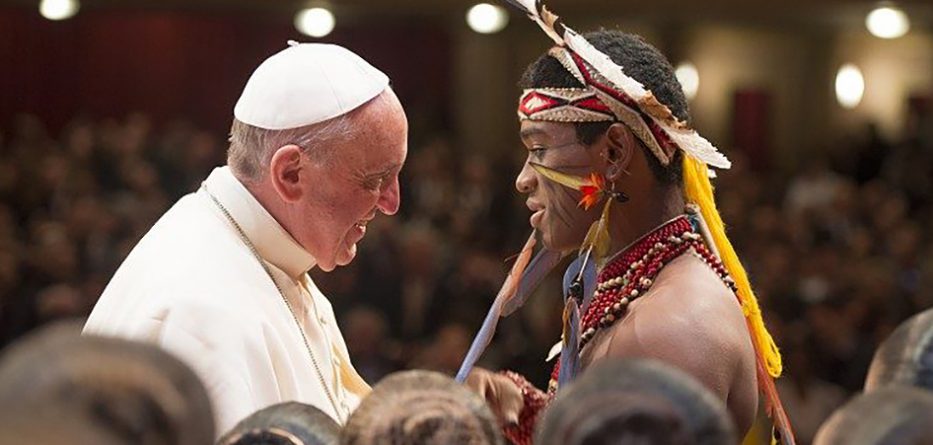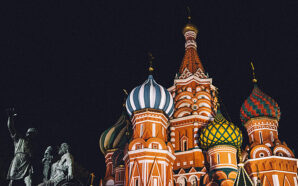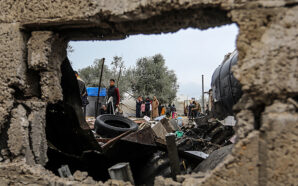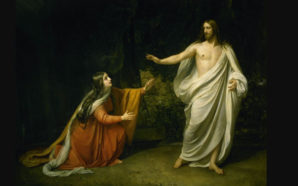How to read Querida Amazonia
Jesus spoke of the need for new wine in new wineskins for a reason: sometimes we don’t see and hear the new thing happening because we’re looking out for the old thing. Nowhere has that been truer than in the reception of Pope Francis’s latest apostolic exhortation, Querida Amazonia. As the dust begins to settle on the reaction to Pope Francis’s response to the Amazon synod, we have only begun to see what his move really consists of, and the future he is opening up: a truly global Catholicism in which lay people assume their responsibility for evangelization, and exercise real authority in a church that is embedded in local, not just Western, clerical culture.
We didn’t see it coming because we were conditioned to wait for what has always come before. We were expecting a ruling from the supreme legislator of the Catholic Church on a disputed ecclesial question; we were looking for a decision. What we got was a dream, a vision, and a prophecy. What we were waiting for was a solution to a pressing problem—the lack of clergy in the Amazon and therefore of access to the Eucharist. What Francis gave us was an answer to a deeper problem: a response to the agonized cry of the people of region, and God’s dream for their fullness of life.
We are used to post-synodal apostolic exhortations that subsume and replace the synod’s concluding report. What we got instead was something quite new: a papal response that complements the synod report with what has resonated in his discernment. We were expecting an old wineskin to carry the wine we were used to, and when we were given a new wineskin we failed to taste the new wine in it. But it’s not too late to look again, and taste.
The pope said he intended neither to duplicate nor to replace the synod final report; ergo, what is not replaced is not refused. Nothing in that report, endorsed by two-thirds of the synod, is rejected; indeed, everything in it is affirmed, endorsed, and given papal recognition. Contrary to almost every news story or reaction to Querida Amazonia, the pope did not rule against the possibility of ordaining married men, or of women deacons, or of anything else the synod agreed to propose. Instead, he said something quite astonishing: that the synod final report was the fruit of a collaboration by people “who know better than I and the Roman curia the problems and issues of the Amazon region.” And he went on to urge pastors, religious, and lay leaders to “strive to apply” the report in Amazonia, while inviting us all—the whole church—to be enriched and challenged by studying it in its integrity. Because, as we shall see, Querida Amazonia is about much more than Amazonia.
Francis prefigured the new thing in Evangelii gaudium, when he said he did not think it “advisable for the Pope to take the place of local Bishops in the discernment of every issue which arises in their territory.” The pope, in short, defers to the discernment of the local church. A Vatican official close to Francis has helped me to understand this. “It’s a complete reversal,” he writes. “Before, the hierarchical scheme needed the validation of the Holy Father, but here the Holy Father places himself in a position of listening to the action of the Spirit in the Synod.” It’s not easy for people to grasp what is going on, he explains, because it involves a category inversion typical of the Gospel’s subversive ways. “Many see in this exhortation a conclusion but it’s the opposite: it values all the proposals of the synod and treats them as a point of departure.”
The bishops have discerned; the pope respects their discernment; now it is they who must act. Far from reacting with disappointment or fury—as so many American and European progressives have—Catholics in Amazonia saw the exhortation as the pope inviting them to take the initiative. Cardinal Cláudio Hummes,the Amazon synod’s relator (chair), told journalists that the question of the ordination of married men would now be dealt with directly by the bishops of the region in dialogue with the pope and the Vatican. The bishop of Juína in the Brazilian region of Mato Grosso, Neri José, who spoke to me regularly during the synod, was one of those strongly urging the ordination of married men and women deacons. “He’s thrown the ball right back in our court,” he told me after reading the exhortation. “Now is the time for courage.”
How will the Amazonian church respond? The pope himself points to the doors waiting to be pushed open: in favorably noting the proposal for an Amazonian rite, and for a territorial episcopal council that would allow the bishops of the region to act together across national boundaries. Dom Neri is among those urging his fellow bishops to form this Amazon-specific “strong synodal body” alongside Celam—the transcontinental episcopal conference—to push these proposals forward. “If [Celam] doesn’t take the initiative,” Dom Neri tells me, “the bishops of the dioceses can seek the competent authority to proceed.” In other words, they can apply diocese by diocese for permission from Rome to ordain viri probati.
But given that this is a decision that would affect the whole Latin-rite church, most observers believe that the ordination of viri probati will be the result of a regional synodal process that creates a new Amazonian rite. “The pope is asking the bishops to come up with concrete proposals,” another Vatican official involved with the synod process told me. “He thinks the time wasn’t yet ripe for any kind of decision by him: there’s too much anxiety, too little clarity. But he expects the bishops to move forward with it.” Cardinal Hummes, who heads the trans-Amazonian church network REPAM, says the future “ecclesial organism” for Amazonia “will have an important role in discussions in the Vatican about how to bring about the ordination of married men in areas of scarcity.” Mauricio López, the executive secretary of REPAM, sees the exhortation as “an invitation to continue exploring ways and channels which will perhaps lead to relaxing the rule [of celibacy].”
Another door has meanwhile opened to a female diaconate. At the end of the synod, Francis promised to reopen and reconstitute the commission looking into women deacons that ended last year in disagreement. That will now happen, says the official involved with the synod. “But he wants the study to go beyond the diaconate, to incorporate a deeper understanding of ministries in the early church.” Because for Francis, to consider the question of ministries only through the lens of the clergy is to get stuck with the old wineskins and to miss the new wine the Spirit is offering.
In this regard, Francis may be respecting the discernment of the synod, but he is not confined by it. Querida Amazonia expresses his conviction that the Spirit has been calling the church to look at something other than the issue of clerical ministries. The sign of that, to Francis, was the polarization over the viri probati issue. He was deeply dismayed at the politicking by curial cardinals Marc Ouellet and Robert Sarah, who attempted to mobilize public opinion against the synod’s discernment by claiming in coordinated books—one before, one after the synod—that the issue had long been settled in favor of mandatory, universal celibacy. But he was also upset at the obsessive focus on the issue during the synod by many of the Amazonian bishops, as if simply ordaining more people would somehow resolve the deeper challenges facing the church.
Whenever two church tribes blindly go to war with each other, Francis sees a sign that the bad spirit has prevailed: we have been deceived into a conviction that a tension between two goods—in this case, a celibate and married priesthood—is a contradiction that must be resolved by the defeat of one side by the other.
In such circumstances, the pope says in Evangelii gaudium, the appropriate response is not to opt for some wishy-washy compromise, nor for one pole to vanquish the other, but rather to be open to “a resolution which takes place on a higher plane and preserves what is valid and useful on both sides.” As he puts it in Querida Amazonia, the answer lies in “transcending the two approaches and finding other, better ways, perhaps not yet even imagined.” Solutions often come in the form of a “greater gift” that God is offering from which “there will pour forth as from an overflowing fountain the answers that contraposition did not allow us to see.”
The pope’s purpose in Querida Amazonia is to offer—passionately, but without dictating or lecturing—some of the answers he sees flowing from that fountain. They are answers that indignant progressives or triumphant conservatives still focused only on the institutional, clerical issue simply fail to see, because they are expecting law and have been given something more like a parable.
Fr. Augusto Zampini Davies, an Argentine official at the Vatican’s Dicastery for Promoting Integral Human Development, suggests the analogy. Like Jesus’ parables, he says, “if you don’t get inside Francis’s dreams, they won’t change you. But if you do, you are changed.” The change Francis is pointing to requires a different way of thinking: not “How do we make sure more communities receive the Eucharist?”—important though that is—but: How can we have communities of life that care for the poor, that know Christ’s nearness? How to ignite the life of the Spirit? How to incarnate Christ?
Fr. Zampini asks me to consider the pope’s dreams as biblical dreams, that offer warnings, open new horizons, show the paths out of slavery into abundant new life. Querida Amazonia is about Amazonia, but it’s really about all of us, he says. Replace Amazonia with the United States, or Kenya, or France, and it is just as resonant. “Try it, you’ll see it works,” he urges. I have. It does.
The first ecology we need, says Francis at the start of the exhortation’s third chapter, is to grasp that freedom from slavery means helping the hearts of people to open trustingly to that God who has not just created all that exists but has given Himself to us in Jesus Christ: “The Lord, who first cares for us, teaches us to care for our brothers and sisters, and the environment that he gifts to us each day.” There is a created order, full of creatures, because there is a Creator; and we are invited to enter into that truth by contemplating our world, not analyzing it; by loving it, not using it; by uniting ourselves to it, entering into it, giving ourselves to it.
So our created world—Amazonia, Arizona, Azerbaijan—is the place of our encounter with our Creator, who is not a distant figure but an incarnated savior. Our place is the locus theologicus of incarnation and therefore inculturation. And in our realization of that truth, our conversion, we abandon our colonialism, our corruption, our technocratic illusions of superiority, and our contempt. Instead, we embrace fraternity, open ourselves to dialogue with all (especially the poor), see all that is created as gift, and work for justice and the dignity of all. We nurture and build up culture; we respect ancestral wisdom born of the symbiotic bond of humankind and the natural world; we listen to our elders and hear the dreams of our young; we stand with the people against the power-drunk bosses who have no use for poetry and song and memory.
The church, says Francis in one of the most beautiful passages in Querida Amazonia, grows through inculturation—by incarnating the Gospel in culture. In nurturing the seeds of the Word the Lord has sown in every people, the Gospel affirms God’s action in that people, building up their culture; and at the same time, the church grows, enriched by each inculturation. It becomes a living tradition that is not the worship of ashes but the preservation of fire, to quote Francis quoting Gustav Mahler.
It would be a shame, says Francis, if people received from the church merely a doctrinal code or a moral imperative, and not “the great message of salvation,” which is “a God who infinitely loves every man and woman and has revealed this love fully in Jesus Christ, crucified for us and risen in our lives.” (Here Francis refers us to chapter four of his earlier exhortation Christus vivit, which describes how Christ loves you, is your savior, and is alive).
Chapter Four of Querida Amazonia is about the inculturation of the Gospel in the Amazon, but is also about what the incarnation of Christ in any culture looks like. In other words, it is about how the church needs to be present in and to a particular people. And thus the question of ministries—the way in which the church serves a people, becoming a means of encounter with Christ—is also a question of inculturation, and so necessarily raises the question of how the church organizes itself to that end.
This is where Francis gently performs his major move. The church’s pastoral presence in the Amazon, he observes, is “precarious” (the English translation, “uneven,” lacks the force of the Spanish) “due in part to the vast expanse of territory” and other existential factors: cultural diversity, the isolation of ethnic groups, and so on. The “in part” is significant; for Francis, geography only partly accounts for the problem. He calls for “a specific, courageous response” from the church to rise to this challenge, which implies a degree of pusillanimity in its response thus far. He then speaks of the need for greater access to the sacraments but immediately adds: “at the same time, there is a need for ministers who can understand Amazonian sensibilities and culture from within.” It is easy to miss the significance of this qualifying sentence, not least because the English translation softens “at the same time” to “also,” so it’s worth spelling out: the sacraments are part of the means, but the end is the inculturation of the Gospel. The purpose is not the expansion of an institutional presence. What matters is inculturated ministry that performs the Incarnation. That is the telos, the deeper purpose or end that must govern our discernment of the means.
Then comes a key passage in which Francis says that, while a priest has the non-delegable qualification to preside at the Eucharist, this does not make him the highest authority in the community. Religious women and lay leaders can and do run communities, he points out, before going on to note the distinctively lay ecclesial culture of the Amazon, where most Catholic communities have no priest and are run by women. Many of these leaders, he says, promote the encounter with God’s Word and growth in holiness through their service, and have spent decades embedded in the life of the communities of the region. He goes on to call for women, in particular, to have their roles publicly recognized and commissioned by bishops, allowing them “to have a real and effective impact on the organization, the most important decisions and the direction of communities.”
Much of the action, in these passages, is happening in the footnotes, where Francis observes that more Amazonian priests are sent to Europe and the United States than to serve in the Amazon, and that there is a lack of seminaries for indigenous priests. Who, in this scenario, is inculturating the Gospel? Is it the clergy or the lay leaders, the women, who are really running the show? Is it possible that the real issue here is a hermeneutic one—that the church in the Amazon has focused too much on the clerical institution, and not seen what gifts are already being poured out on the People of God?
If you ask that question again but replace “Amazon” with your own parish or diocese, then you’ll get Francis’s larger point. But not everyone will: these are new wineskins.
Austen Ivereigh is author of Wounded Shepherd: Francis and his struggle to convert the Catholic Church (Henry Holt).
Reproduced with the permission of Commonweal Magazine.








